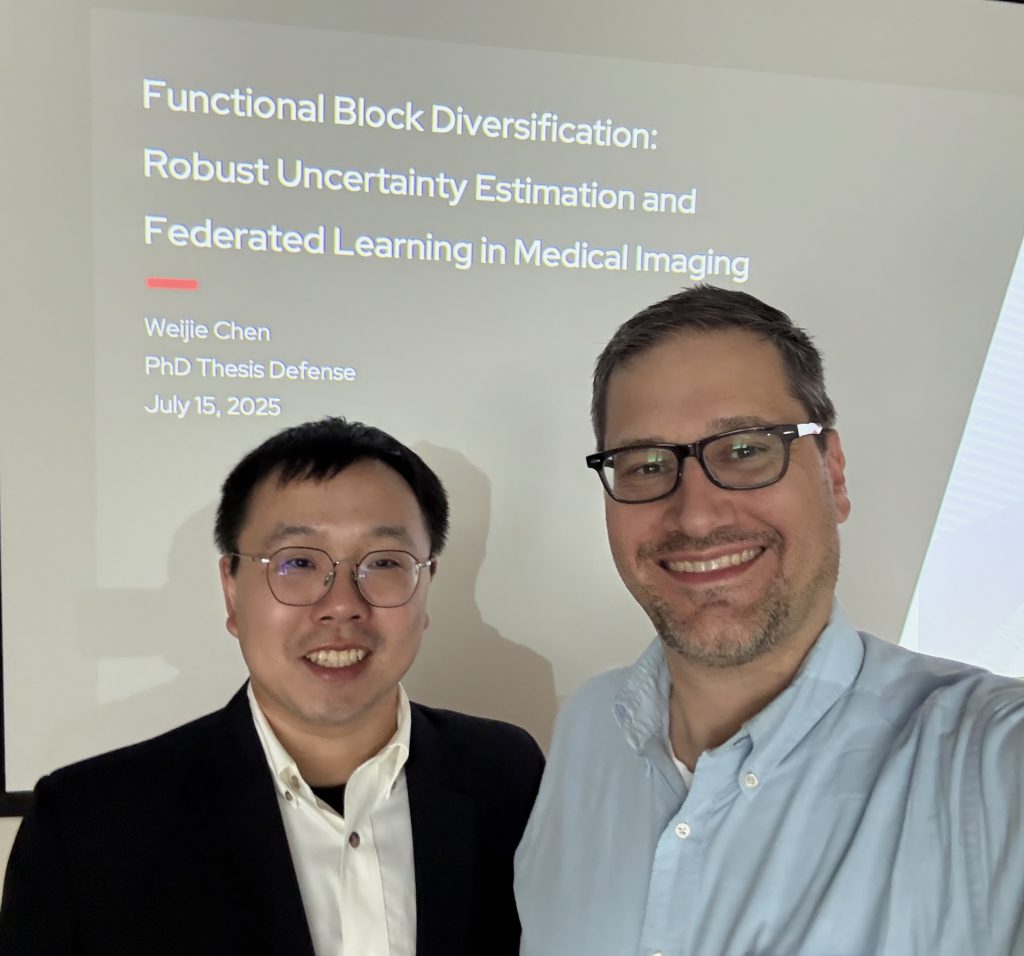The Molecular Imaging Technology Research Program (MITRP) is proud to extend its warmest congratulations to our valued team member, Dr. Weijie Chen, who successfully defended his PhD thesis on July 14, 2025. Weijie’s work embodies the core mission of our lab—to advance MRI, PET/MR, and PET/CT techniques to gain new information for better detection and assessment of human disease. His research represents a significant leap forward in making artificial intelligence a more robust, reliable, and transparent tool for clinicians.
His dissertation, titled “Functional Block Diversification: Robust Uncertainty Estimation and Federated Learning in Medical Imaging,” tackles some of the most pressing challenges facing the integration of machine learning in healthcare. While AI models show immense promise, their black box nature, potential for unexpected errors, and the difficulty of training them on private medical data have slowed their adoption. Dr. Chen’s work directly confronts these issues with an elegant and powerful solution.
At the heart of his research is a framework called Functional Block Diversification (FBD). Instead of treating a neural network as a single, monolithic entity, FBD deconstructs it into discrete, interchangeable functional blocks. By training and recombining these blocks, the framework efficiently creates a diverse family of models from a single trained checkpoint. This approach has two profound benefits. First, it improves performance and robustness in critical imaging tasks. Second, and perhaps more importantly, it enables an uncertainty map with every prediction. This map highlights areas where the model is less confident, allowing clinicians to immediately identify regions that may require closer scrutiny, thereby transforming the AI from an opaque oracle into an interpretable clinical partner.
Dr. Chen demonstrated his framework on several key medical image analysis tasks. He demonstrated superior performance in medical image segmentation and in the synthesis of CT images from MR data—a crucial step for attenuation correction in PET/MR. Beyond single-model performance, his research extended FBD to larger problems in medical AI. Recognizing that data privacy is paramount, he successfully integrated FBD into a federated learning pipeline. This allows different institutions to collaboratively train a powerful, shared model on their combined data without ever having to expose sensitive patient information, overcoming the data silo problem that often hampers medical research. To demonstrate the versatility of his methods, he also applied them to other challenging tasks, including generating synthetic CT images from PET data, correcting for partial volume effects in PET, and reconstructing full-dose PET images from low-dose scans, which is critical for reducing patient radiation exposure.
Dr. Chen’s distinguished committee included:
- Grigoris Chrysos, PhD (Assistant Professor, Electrical and Computer Engineering)
- Diego Hernando, PhD (Associate Professor, Radiology)
- Yu Hen Hu, PhD (Professor, Electrical and Computer Engineering)
- Yin Li, PhD (Associate Professor, Biostatistics and Medical Informatics)
- Alan McMillan, PhD (Professor, Radiology)
Contributions
Dr. Chen’s has a strong list of academic contributions. His work has appeared in respected journals and has been presented at major international conferences, showcasing the impact and reach of his research.
Manuscripts
- Chen, W. and McMillan, A., “FBD-FL: Functional Block Diversification in Federated Learning for Robustness and Active Uncertainty”, July 2025, in submission
- Chen, W. and McMillan, A., “SASWISE-UE: Segmentation and Synthesis with Interpretable Scalable Ensembles for Uncertainty Estimation”, Computers in Biology and Medicine 2025, 194, 110258.
- Chen, W., et al. “BAE-ViT: An Efficient Multimodal Vision Transformer for Bone Age Estimation,” Tomography 2024, 10(12), 2058-2072.
- Chen, W., et al. ”RobMedNAS: searching robust neural network architectures for medical image synthesis.” Biomedical Physics & Engineering Express 10.5 (2024): 055029.
- Wang, J., Bermudez, D., Chen, W., et al. ”Motion-correction strategies for enhancing whole-body PET imaging,” Frontiers in Nuclear Medicine, Sec. PET and SPECT, vol. 4, Feb. 2024, DOI:10.3389/fnume.2024.1257880
- Tie, X., Chen, W., et al. Deep Learning for Longitudinal Gross Tumor Volume Segmentation in MRI-Guided Adaptive Radiotherapy for Head and Neck Cancer. arXiv preprint arXiv:2412.00663.
- Park, C., Chen, W., et al. “Initial Experience With Low-Dose 18F-Fluorodeoxyglucose Positron Emission Tomography/Magnetic Resonance Imaging With Deep Learning Enhancement,” Journal of Computer Assisted Tomography, vol. 45, no. 4, pp. 637–642, Jun. 2021, DOI:10.1097/rct.0000000000001174.
- Torres-Velazquez, M., Chen, W., et al. “Application and Construction of Deep Learning Networks in Medical Imaging,” IEEE Transactions on Radiation and Plasma Medical Sciences, vol. 5, no. 2, pp. 137–159, Mar. 2021, DOI:10.1109/trpms.2020.3030611.
Conference Abstracts
- Chen, W., et al. ”Synthetic CT Generation from Time-of-Flight Non-Attenuation-Corrected PET for Whole-Body PET Attenuation Correction”, 2025 IEEE International Symposium on Biomedical Imaging (ISBI), Houston, TX.
- Tie, X., Chen, W., et al. ”Longitudinal Gross Tumor Volume Segmentation Using a Mask-Aware Network in MRI- Guided Adaptive Radiotherapy for Head and Neck Cancer”, Head and Neck Tumor Segmentation for MR-Guided Applications (HNTS-MRG) 2024, Oct 17, Houston, TX, USA.
- Joshi, T., Chen, W., et al. ”Label Noise Robustness of Input-Output Convex Neural Networks in Chest X-Ray Imaging”, 2023 Midwest Machine Learning Symposium (MMLS 2023), May 16-17, Chicago, IL, USA
- Chen, W., et al. ”Exploration of Vision Transformer Models in Medical Image Synthesis.” The 31st Annual Meeting of International Society for Magnetic Resonance in Medicine (ISMRM 2022), May 7-12, London, UK.
- Park C., Chen, W., et al. ”Ultra-low-dose FDG PET/MR Enterography with Deep-Learning Image Reconstruction”, The 43rd Annual Meeting of Society for Advanced Body Imaging (SABI 2020), October 10-13, online and the 106th Scientific Assembly and Annual Meeting of Radiology Society of North America (RSNA 2020), Nov 29 – Dec 5, 2020, online.
- Chen, W., et al. ”Single Subject Deep Learning-based Partial Volume Correction for PET using Simulated Data and Cycle Consistent Networks”, The Society of Nuclear Medicine and Molecular Imaging (SNMMI) Annual Meeting (SNMMI 2020), June 13–16, New Orleans, LA, USA.
We are incredibly proud of the work Weijie has accomplished. Please join everyone at MITRP in congratulating Dr. Chen on this outstanding achievement and wishing him the best in his future endeavors!
Find Dr. Weijie Chen on LinkedIn: https://www.linkedin.com/in/winstonchen2017/
